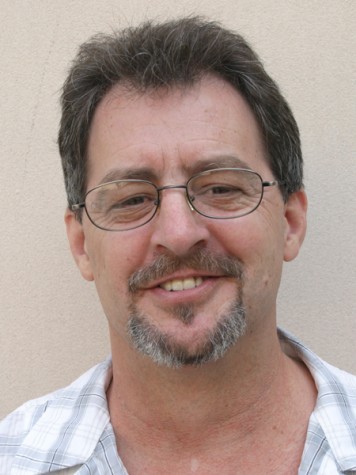Speech professor Ted Levatter was posed an interesting question prior to his lecture on Barack Obama’s speech in Berlin on May 21.
“I heard you were doing a presentation about Barack Obama, did you vote for him?” his colleague asked him.
“Yeah I did,” responded Levatter, “But I thought to myself, ‘Even if I hadn’t voted for him, I would still do a presentation about his speaking skills.’ Whether you voted for him or not, we can all agree he’s a master orator.”
Since he kicked off his campaign in Iowa, President Obama has mesmerized hundreds of thousands of people with his charisma, his speaking power and his words, not only making him a good politician, but also cementing his place amongst the greatest orators of all time according to Levatter.
However, there have been few who have challenged Obama’s way with words and one would have to look no further than his current Secretary of State Hilary Rodham Clinton.
“Mr. Obama, you speak in poetry, but you govern in prose,” said Clinton during the Democratic primaries.
“My contention today is that in fact being a skilled public speaker is really an essential skill for being a great leader,” said Levatter.
Nevertheless, Obama’s speech in Berlin delivered, and it was because of the force and power behind his words that he was treated less like just another politician by foreign ministers and leaders and more like a president-in-waiting.
Levatter then put not only Obama’s speech, but also the famous speeches Presidents John F. Kennedy and Ronald Regan in historical context in their respective periods in history.
Obama, like his predecessors Kennedy and Regan spoke at the same spot in Berlin, albeit during very different circumstances.
Kennedy and Regan’s words reverberated throughout a divided Berlin. Russia occupied the eastern portion of the city, known as East Berlin, and the allied forces of the United States, France, and England occupied the area known as West Berlin.
In 1961, the Soviets built the infamous Berlin Wall to keep East Germans from fleeing into West Berlin. Two years later, Kennedy made his historic trip to Berlin where he said his famous words “Ich bin ein Berliner” to a hopeful crowd.
When it was Regan’s turn in 1987, the Berlin Wall had become a symbol of Cold War tension between the Allies and the Soviets. Three years later after the words “Mr. Gorbachev, tear down this wall,” the collapse of the Berlin Wall came, and with it came the Soviet Union.
“So essentially what then-candidate Barack Obama did in orchestrating this speech at the Berlin Wall was paint himself as a potentially credible world leader,” said Levatter.
However, one does not have be the president of the United States to deliver a resonating speech. Levatter, in his lecture, cited several key speaking tips that can help anyone’s speech reach new heights.
The first is clear speech articulation. “The ability to articulate your vowels, consonants and diphthongs clearly to your audience,” said Levatter.
Using a vocal quality that is pleasing to your audience, and not monotonous, or as Levatter cited, not being “Ben Stein in ‘Ferris Bueller’s Day Off.'”
“One of the wonderful things about the speeches of Barack Obama is the use of language,” said Levatter. “But does anyone know who writes Barack Obama’s speeches?” asked Levatter.
The crowd that gathered in Kreider hall at noon more or less agreed that Obama wrote all of his speeches himself.
While he does have a hand in writing his speeches, Obama, to the disbelief of the crowd, has a team of three speechwriters headed up by 26-year-old Jon Favreau.
“Only several American presidents wrote their own speeches. Abraham Lincoln wrote his own as well as Woodrow Wilson. But most had a team of speech writers and Barack Obama is no different” said Levatter. “The oldest member of the team is 30 years old.”
Many of Obama’s speeches, including the one he delivered in Berlin, used the five stylistic devices of personal narrative, alliteration, color and imagery, parallel construction and antithesis.
Watching, listening or reading Obama’s speeches, he more often than not uses his own story (personal narrative) as a way to not only introduce himself to his audience, but also to show that he is merely a “fellow citizen of the world.”
“As we speak, cars in Boston and factories in Beijing are melting the ice caps in the Arctic, shrinking coastlines in the Atlantic, and bringing drought to farms from Kansas to Kenya.” A perfect example of alliteration: the repetition of the initial consonant sounds in closely connected words.
The use of color and imagery in this speech, in particular, is key due to his location of delivery. He used the words “a heavy fog filled the sky” and “the streets where we stand were filled with hungry families,” to put the audience in the shoes of a troubled people.
“People of the world look at Berlin,” said Obama last July. “Look at Berlin, where a wall came down, a continent came together, and history proved that there is no challenge too great for a world that stands as one.” The words “look at Berlin” repeated four times demonstrates the use of parallel construction to build up emotion much like the words “I have a dream.”
Contrasts are used to present a choice and show the divides that still languish even in the 21st Century.
“The walls between old allies on either side of the Atlantic cannot stand. The walls between the countries with the most and those with the least cannot stand. The walls between races and tribes; natives and immigrants; Christian and Muslim and Jew cannot stand. These now are the walls we must tear down.”
Following these steps may not guarantee a path to the presidency, but if it worked for the son of a goat farmer, the grandson of a domestic servant, maybe it will work for the GCC student taking a speech 101 class.

